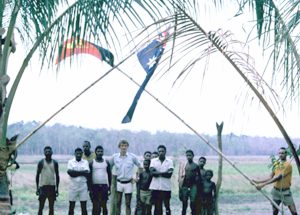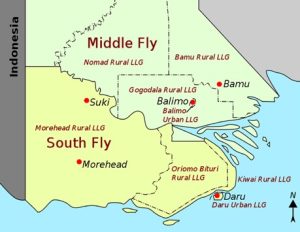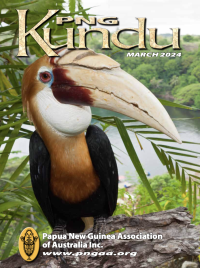Destination PNG 1972 – Deryck Thompson
In late 1971 there was a notice in the Australian press advertising positions available as Assistant Patrol Officers in Papua New Guinea. I applied, and in my interview in Melbourne,
I was told that successful applicants would be offered a two-by-two year contract and that due to political changes taking place in Papua New Guinea most likely there would be no extensions after four years expired. As it turned out those political changes did happen, but I stayed on in government service in various capacities until 1988.

At Gigwa—both flags flying—Suki Lagoon in the background would normally be covered by several metres of water
Sixty-two liklik kiaps were recruited and I was one of them and, as it turned out, we were the very last intake of patrol officers recruited from Australia. On Tuesday, 21 February 1972, 24 of us flew into Port Moresby to commence an eight-weeks training course at Four Mile, Boroko. The other 38 recruits were all sent to the Australian School of Pacific Administration for a four-month training course. On our arrival at Jackson’s airstrip, we were met by Training Officer Dave Reid who told us that he had only been advised the week before that we were arriving and that he was still preparing course materials. Yes, it was the Land of the Unexpected, even then!! Dave provided us with a driver and one of those old blue government truck-like buses with no windows and for the rest of the week we explored Port Moresby and surrounds.
We covered many topics in our training course—ranging from the customs and culture of Papua New Guinea to land surveying and bomb recognition—as there was still a lot of unexploded WWII ordinance around. One day was spent at Bomana Police College learning about Police matters—like tear gas—how to throw it and then walk through it! I remember that the general feeling was that we had come to PNG to work with the locals—not to throw tear gas at them! We were also taught tok pisin but my first posting was on the south coast so, on arrival in the field, I had to learn Police Motu. Apart from all that, we spent a lot of time familiarising ourselves with, and debating the merits of, SP green and SP brown.
 My first posting was Morehead in the then Western District and, on arrival there on 26 April 1972, I was met on the airstrip by ADC, Mike Eggleton. During my 18 months at Morehead I spent 200 nights on patrol carrying out various tasks like census, attending to village disputes, and maintenance of roads, bridges, aid posts and school buildings. One of the big tasks was ‘political education’ as PNG was approaching self-government. I carried with me Papua New Guinea and Australian flags and flew them at every opportunity. I had a large map of PNG, which also showed the islands of the Torres Straits, and I would display it when trying to explain self-government. I would often use the analogy that PNG was like a canoe being towed along by Australia and thatsoon the rope would be cut and PNG would paddle away to seek its own destiny. Many people of the Morehead area, particularly on the south coast, had heard about, or had visited Saibai or Boigu, and they knew that Australia was further down south. However, most people were focussed on subsistence living and did not seem too concerned by the imminent political changes.
My first posting was Morehead in the then Western District and, on arrival there on 26 April 1972, I was met on the airstrip by ADC, Mike Eggleton. During my 18 months at Morehead I spent 200 nights on patrol carrying out various tasks like census, attending to village disputes, and maintenance of roads, bridges, aid posts and school buildings. One of the big tasks was ‘political education’ as PNG was approaching self-government. I carried with me Papua New Guinea and Australian flags and flew them at every opportunity. I had a large map of PNG, which also showed the islands of the Torres Straits, and I would display it when trying to explain self-government. I would often use the analogy that PNG was like a canoe being towed along by Australia and thatsoon the rope would be cut and PNG would paddle away to seek its own destiny. Many people of the Morehead area, particularly on the south coast, had heard about, or had visited Saibai or Boigu, and they knew that Australia was further down south. However, most people were focussed on subsistence living and did not seem too concerned by the imminent political changes.
I spent most of my time in the trans-Fly area to the east of Morehead, but 1972 was one of those periodic dry years —the previous one had been in 1965 when the Catalinas stopped flying to Lake Murray. Wildfires ravaged the Morehead savannah, and yam houses in some garden hamlets were burned to the ground as owners were away seeking water. In October of that year, I was able to travel along very rough tracks, initially by tractor and trailer, then on foot, then by canoe to Gigwa on Suki Lagoon. In a normal year access would have been mostly by water transport. It was a tough year for village people but they faced it with their usual resilience, just as they have been resilient with managing life in the Independent State of Papua New Guinea.




